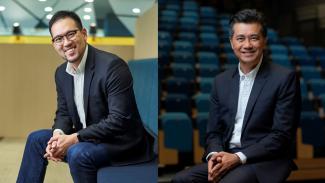
In a remarkable testament to the academic prowess housed within Singapore Management University’s (SMU) Lee Kong Chian School of Business (LKCSB), two faculty members – Professor of Communication Management Augustine Pang and Associate Professor of Strategic Management & Entrepreneurship Kenneth Goh – have recently clinched ‘Best Paper’ awards by journals in their respectively disciplines, solidifying the School’s reputation for scholarly excellence.
The accolades not only underscore the calibre of research emanating from SMU but also highlight the pivotal role the university plays in shaping thought leadership and contributing to advancements in various fields.
2023 Outstanding Article in the International Journal of Business Communication
Each year, the Association for Business Communication (US) names an article in the International Journal of Business Communication that contributes significantly to scholarship, research, and/or pedagogy; and demonstrates originality of thought and careful investigation.
Breaking the Sound of Silence: Explication in the use of strategic silence in crisis communication was recognised as the 2023 Outstanding Article in the International Journal of Business Communication. The article is by Augustine Pang (SMU), Yan Jin (University of Georgia), Youngji Seo (Syracuse University), Sung In Choi (University of Georgia), Hui-Xun Teo, Le Duc Phuong (Prof Pang’s former masters’ students at NTU) and Bryan Reber (University of Georgia).
The study is the second in the stream of research on silence in crisis communication conducted by Professor Pang, who is also Associate Dean (Partnerships & Engagement) and Academic Director, Master of Science in Communication Management at SMU LKCSB. The first study, When is silence golden? The use of strategic silence in crisis communication had also won the Outstanding Article on Business Communication in Non-ABC Journal in 2021, also awarded by the Association for Business Communication (US).
“For decades, silence is not recognised as a type of crisis response in crisis research hence not studied. This study examined first, if silence can be used as a strategy, an idea that has not been examined by current theories; second, under what circumstances should silence be broken; and third, when silence is broken, how it affects a) organisational reputation, b) societal risk perception, and c) the publics’ crisis information sharing intention,” explained Professor Pang.
The study was done through an online experiment using a nationally representative sample in the United States. It found that organisations should first, time the breaking of silence instead of being forced to break silence by external circumstances. This would not augur well for their reputation. Second, in situations where there are higher societal risks caused by the crisis, as perceived by publics, the more likely the publics would share crisis information.
“Once organisations are mindful of this, it will inform them how to plan the release of information and not remain silent,” he added.
2023 Emerald Literati Awards – Outstanding Paper
The article The effects of conflict type and conflict expression intensity on conflict management led by Associate Professor Gergana Todorova (California State University, Fullerton), Associate Professor Kenneth Goh (SMU) and Professor Laurie R. Weingart (Carnegie Mellon University) published in the International Journal of Conflict Management, won the Outstanding Paper in the 2023 Emerald Literati Awards. Associate Professor Goh is also Academic Director of SMU’s Business Families Institute.
Their study found that when conflicts are task-related and not particularly intense, individuals tend to favour collaborative approaches, such as problem-solving or compromise. On the other hand, in conflicts that are personal or emotionally charged, individuals are more likely to respond with a forceful and self-focused approach. The choice between these two approaches is influenced by a person’s tendency to search for information to resolve the conflict and the negative emotions they experience during the conflict. This research builds on existing theories that previously conceptualized conflict resolution approaches as independent of the type of conflict.
Highlighting the practical implications of the research, Associate Professor Goh said, “If you are involved in a disagreement with a team member that is getting personal or is intensely expressed, there is a tendency to respond forcefully. But doing so can hurt team satisfaction and trust. Instead, take steps to de-escalate the situation, manage the negative emotions, and focus on being open to information to maintain a more productive problem-solving approach.
The International Journal of Conflict Management is a premier global journal that publishes original peer-reviewed research papers that provide scholars and practitioners with insightful analyses and new methods for the successful management of conflicts between people, organisations and cultures.
- End -

